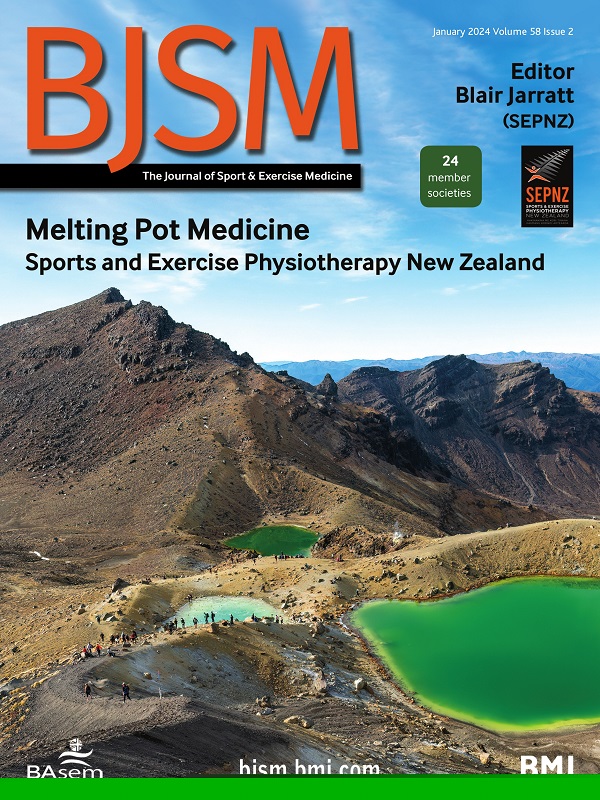Association of muscle strength and cardiorespiratory fitness with all-cause and cancer-specific mortality in patients diagnosed with cancer: a systematic review with meta-analysis
IF 11.6
1区 医学
Q1 SPORT SCIENCES
引用次数: 0
Abstract
Objectives To examine the association between muscle strength and cardiorespiratory fitness (CRF) with all-cause and cancer-specific mortality in patients diagnosed with cancer, and whether these associations are affected by type and/or stage of cancer. Method A systematic review with meta-analysis was carried out. Five bibliographic databases were searched to August 2023. Results Forty-two studies were included (n=46 694). Overall, cancer patients with high muscle strength or CRF levels (when dichotomised as high vs low) had a significant reduction in risk of all-cause mortality by 31–46% compared with those with low physical fitness levels. Similarly, a significant 11% reduction was found for change per unit increments in muscle strength. In addition, muscle strength and CRF were associated with an 8–46% reduced risk of all-cause mortality in patients with advanced cancer stages, and a 19–41% reduced risk of all-cause mortality was observed in lung and digestive cancers. Lastly, unit increments in CRF were associated with a significant 18% reduced risk of cancer-specific mortality. Conclusion High muscle strength and CRF were significantly associated with a lower risk of all-cause mortality. In addition, increases in CRF were associated with a reduced risk of cancer-specific mortality. These fitness components were especially predictive in patients with advanced cancer stages as well as in lung and digestive cancers. This highlights the importance of assessing fitness measures for predicting mortality in cancer patients. Given these findings, tailored exercise prescriptions to improve muscle strength and CRF in patients with cancer may contribute to reducing cancer-related mortality. Data are available upon reasonable request. The data that support the findings of this study are available from the corresponding author upon reasonable request.在诊断为癌症的患者中,肌肉力量和心肺健康与全因死亡率和癌症特异性死亡率的关系:一项荟萃分析的系统综述
目的探讨肌肉力量和心肺功能(CRF)与癌症诊断患者全因死亡率和癌症特异性死亡率之间的关系,以及这些关系是否受到癌症类型和/或分期的影响。方法采用系统评价和meta分析。检索5个书目数据库至2023年8月。结果共纳入42项研究(n=46 694)。总体而言,与身体健康水平较低的癌症患者相比,肌肉力量或CRF水平高的癌症患者的全因死亡率显著降低31-46%。同样,肌肉力量每单位增量的变化显著减少11%。此外,肌肉力量和CRF与晚期癌症患者全因死亡率降低8-46%相关,肺癌和消化道癌症患者全因死亡率降低19-41%。最后,CRF的单位增量与癌症特异性死亡风险显著降低18%相关。结论高肌力和CRF与较低的全因死亡风险显著相关。此外,CRF的增加与癌症特异性死亡率的降低有关。这些健康成分在晚期癌症患者以及肺癌和消化道癌症患者中尤其具有预测性。这突出了评估健康指标对预测癌症患者死亡率的重要性。鉴于这些发现,量身定制的运动处方可以改善癌症患者的肌肉力量和CRF,可能有助于降低癌症相关的死亡率。如有合理要求,可提供资料。支持本研究结果的数据可根据通讯作者的合理要求提供。
本文章由计算机程序翻译,如有差异,请以英文原文为准。
求助全文
约1分钟内获得全文
求助全文
来源期刊
CiteScore
27.10
自引率
4.90%
发文量
217
审稿时长
3-8 weeks
期刊介绍:
The British Journal of Sports Medicine (BJSM) is a dynamic platform that presents groundbreaking research, thought-provoking reviews, and meaningful discussions on sport and exercise medicine. Our focus encompasses various clinically-relevant aspects such as physiotherapy, physical therapy, and rehabilitation. With an aim to foster innovation, education, and knowledge translation, we strive to bridge the gap between research and practical implementation in the field. Our multi-media approach, including web, print, video, and audio resources, along with our active presence on social media, connects a global community of healthcare professionals dedicated to treating active individuals.

 求助内容:
求助内容: 应助结果提醒方式:
应助结果提醒方式:


